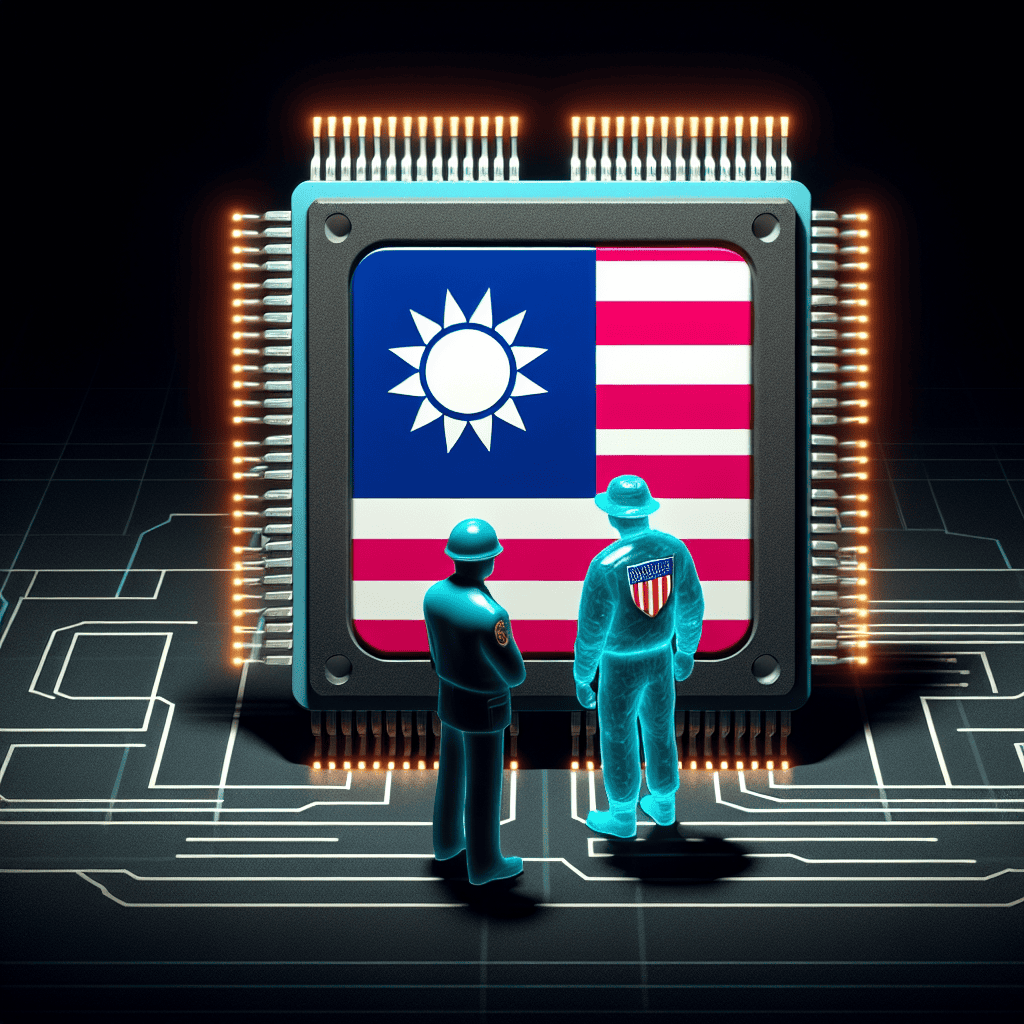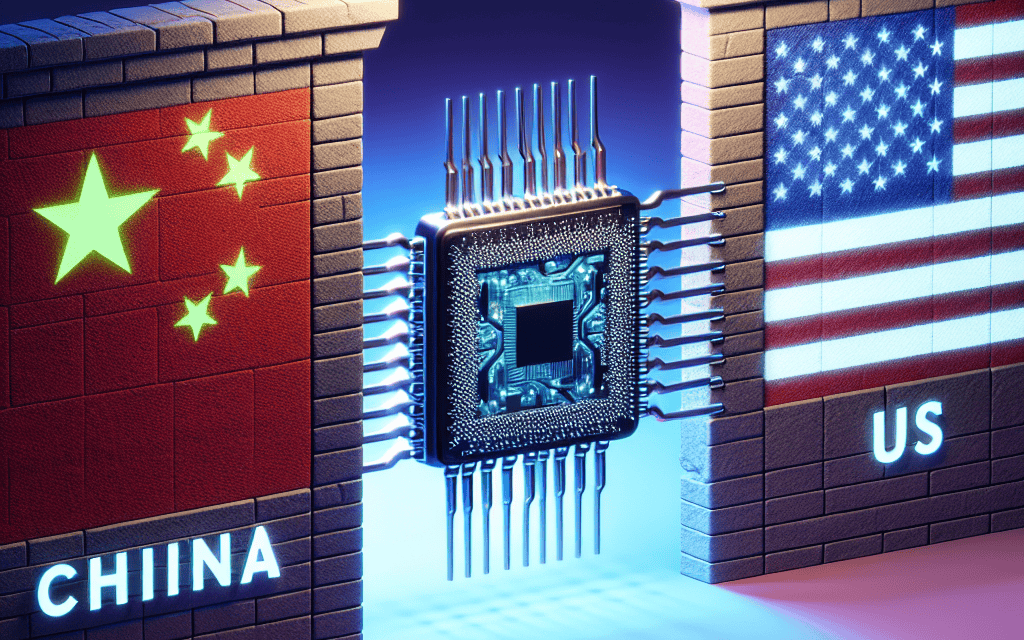“Navigating the Tightrope: TSMC Alerts US on Potential China AI Chip Regulation Breach”
Introduction
Taiwan Semiconductor Manufacturing Company (TSMC), the world’s leading contract chipmaker, has raised concerns with the United States regarding potential breaches in the newly imposed restrictions on artificial intelligence (AI) chip exports to China. The company has highlighted the challenges and complexities involved in adhering to these regulations, which aim to curb China’s access to advanced semiconductor technologies. TSMC’s warning underscores the intricate balance between complying with international trade policies and maintaining its pivotal role in the global semiconductor supply chain. As geopolitical tensions continue to influence the tech industry, TSMC’s alert serves as a critical reminder of the ongoing challenges faced by companies operating at the intersection of technology and international policy.
Impact Of TSMC’s Warning On Global Semiconductor Supply Chain
Taiwan Semiconductor Manufacturing Company (TSMC), the world’s leading semiconductor foundry, has recently issued a warning to the United States regarding potential breaches in the restrictions imposed on the export of advanced AI chips to China. This development has significant implications for the global semiconductor supply chain, which is already under considerable strain due to geopolitical tensions and the ongoing technological race between major world powers. As TSMC plays a pivotal role in the production of cutting-edge semiconductors, its cautionary message underscores the delicate balance that must be maintained to ensure the stability and security of this critical industry.
The restrictions in question are part of a broader strategy by the United States to curb China’s access to advanced technologies that could enhance its military and technological capabilities. By limiting the export of high-performance AI chips, the U.S. aims to maintain its competitive edge in the global tech landscape. However, TSMC’s warning suggests that these measures may not be as foolproof as intended, potentially allowing China to circumvent the restrictions and gain access to the technology it seeks. This possibility raises concerns about the effectiveness of current regulatory frameworks and the need for more robust mechanisms to enforce compliance.
The potential breach of AI chip restrictions could have far-reaching consequences for the global semiconductor supply chain. As a key supplier to numerous technology companies worldwide, TSMC’s operations are integral to the production of a wide range of electronic devices, from smartphones to data centers. Any disruption in its ability to adhere to export controls could lead to significant supply chain bottlenecks, affecting not only the availability of advanced chips but also the broader electronics market. This scenario could exacerbate existing supply chain challenges, which have been compounded by the COVID-19 pandemic and geopolitical tensions.
Moreover, TSMC’s warning highlights the interconnectedness of the global semiconductor industry, where actions taken by one player can have ripple effects across the entire ecosystem. The semiconductor supply chain is characterized by its complexity, with multiple stages of production and a diverse array of stakeholders involved. As such, any potential breach in export restrictions could trigger a cascade of reactions, prompting other countries and companies to reassess their own policies and strategies. This could lead to a realignment of alliances and partnerships, as nations seek to safeguard their technological interests and ensure a steady supply of critical components.
In response to TSMC’s warning, it is imperative for policymakers and industry leaders to collaborate on developing more effective measures to monitor and enforce export controls. This may involve leveraging advanced technologies such as blockchain and artificial intelligence to enhance transparency and traceability within the supply chain. Additionally, fostering greater international cooperation and dialogue will be crucial in addressing the challenges posed by the evolving geopolitical landscape and ensuring the resilience of the semiconductor industry.
In conclusion, TSMC’s warning to the United States about potential breaches in China AI chip restrictions serves as a stark reminder of the vulnerabilities inherent in the global semiconductor supply chain. As the industry navigates an increasingly complex and competitive environment, it is essential for stakeholders to work together to address these challenges and safeguard the future of this vital sector. By doing so, they can help ensure that the benefits of technological advancement are shared equitably and sustainably across the globe.
TSMC’s Role In The US-China Tech Tensions
Taiwan Semiconductor Manufacturing Company (TSMC), a pivotal player in the global semiconductor industry, has recently raised concerns about potential breaches in the United States’ restrictions on artificial intelligence (AI) chip exports to China. As the world’s largest contract chipmaker, TSMC’s warning underscores the intricate dynamics at play in the ongoing tech tensions between the US and China. The company’s alert comes at a time when the US government is intensifying its efforts to curb China’s access to advanced technologies, particularly those that could enhance its military capabilities.
TSMC’s role in this geopolitical landscape is significant, given its position as a key supplier to major American tech firms and its substantial manufacturing operations in Taiwan. The company’s advanced semiconductor technologies are crucial for the development of AI applications, making it a central figure in the US-China tech rivalry. By highlighting potential breaches, TSMC is not only safeguarding its business interests but also aligning with US policies aimed at maintaining technological superiority over China.
The US has implemented stringent export controls to prevent China from acquiring cutting-edge AI chips, which are essential for developing sophisticated AI systems. These restrictions are part of a broader strategy to limit China’s technological advancements and ensure that American companies retain their competitive edge. However, enforcing these controls is a complex task, given the global nature of the semiconductor supply chain and the myriad of players involved.
TSMC’s warning suggests that there may be loopholes or vulnerabilities in the current regulatory framework that could be exploited. This revelation is likely to prompt US authorities to reassess and potentially tighten their export control measures. Moreover, it highlights the challenges faced by companies like TSMC, which must navigate the delicate balance between complying with US regulations and maintaining their business relationships with Chinese clients.
In addition to regulatory challenges, TSMC’s warning also reflects the broader implications of the US-China tech tensions on the global semiconductor industry. As the demand for AI chips continues to surge, companies are under pressure to innovate and expand their production capacities. However, geopolitical uncertainties and trade restrictions can disrupt supply chains and hinder growth prospects. TSMC, with its extensive expertise and resources, is well-positioned to adapt to these challenges, but smaller firms may struggle to keep pace.
Furthermore, TSMC’s alert serves as a reminder of the interconnectedness of the global tech ecosystem. The semiconductor industry relies on a complex web of suppliers, manufacturers, and customers spread across different countries. Any disruption in this network can have far-reaching consequences, affecting not only the companies directly involved but also the broader economy.
In conclusion, TSMC’s warning about potential breaches in US AI chip restrictions to China highlights the intricate and multifaceted nature of the ongoing tech tensions between the two superpowers. As a key player in the semiconductor industry, TSMC’s actions and insights are crucial in shaping the future of global technology dynamics. The company’s alert underscores the need for robust regulatory frameworks and international cooperation to address the challenges posed by these tensions. As the situation continues to evolve, stakeholders across the industry will need to remain vigilant and adaptable to navigate the complexities of this rapidly changing landscape.
Implications For The AI Chip Market Amid TSMC’s Concerns
The recent warning from Taiwan Semiconductor Manufacturing Company (TSMC) to the United States regarding potential breaches in China AI chip restrictions has sent ripples through the global semiconductor industry. As the world’s leading contract chipmaker, TSMC’s concerns carry significant weight, particularly in the context of the rapidly evolving artificial intelligence (AI) landscape. The implications of such a breach are profound, not only for the companies directly involved but also for the broader AI chip market, which is already navigating a complex web of geopolitical tensions and technological advancements.
To understand the gravity of TSMC’s warning, it is essential to consider the backdrop against which these concerns have emerged. The United States has imposed stringent export controls on advanced semiconductor technologies to China, aiming to curb the latter’s ability to enhance its military capabilities and technological prowess. These restrictions are part of a broader strategy to maintain a competitive edge in AI and other critical technologies. However, TSMC’s alert suggests that these measures may not be as foolproof as intended, potentially allowing China to circumvent restrictions and gain access to cutting-edge AI chips.
The potential breach of these restrictions could have far-reaching consequences for the AI chip market. For one, it could lead to a realignment of supply chains as companies reassess their strategies to ensure compliance with export controls. This realignment may result in increased costs and delays, affecting the availability and pricing of AI chips globally. Moreover, the uncertainty surrounding compliance could deter investment in new technologies, slowing down innovation in the sector.
Furthermore, TSMC’s warning highlights the delicate balance that companies must strike between adhering to regulatory requirements and maintaining their competitive position in the market. As the demand for AI chips continues to surge, driven by advancements in machine learning, autonomous vehicles, and other AI applications, companies are under pressure to deliver cutting-edge solutions. However, navigating the complex regulatory landscape requires careful consideration of both legal obligations and market dynamics.
In addition to these market implications, TSMC’s concerns underscore the broader geopolitical tensions that are shaping the semiconductor industry. The rivalry between the United States and China in the technology domain is intensifying, with both nations vying for dominance in AI and other emerging technologies. This competition is not only about economic supremacy but also about national security, as AI technologies have the potential to transform military capabilities and influence global power dynamics.
As the situation unfolds, stakeholders in the AI chip market must remain vigilant and proactive in addressing these challenges. Companies will need to invest in robust compliance mechanisms to ensure adherence to export controls while also exploring innovative solutions to mitigate the impact of potential supply chain disruptions. Additionally, collaboration between governments and industry players will be crucial in developing a regulatory framework that balances security concerns with the need for technological advancement.
In conclusion, TSMC’s warning to the United States about possible breaches in China AI chip restrictions serves as a stark reminder of the complexities and challenges facing the AI chip market. The implications of such breaches extend beyond immediate market dynamics, touching on broader issues of geopolitical tension and technological competition. As the industry navigates this intricate landscape, a concerted effort will be required to ensure that the pursuit of innovation does not come at the expense of compliance and security.
How TSMC’s Warning Could Affect US Tech Policy

Taiwan Semiconductor Manufacturing Company (TSMC), a pivotal player in the global semiconductor industry, has recently raised concerns regarding potential breaches in the United States’ restrictions on artificial intelligence (AI) chip exports to China. This warning comes at a time when the geopolitical landscape is increasingly fraught with tensions, particularly between the US and China, over technological supremacy and national security. TSMC’s alert underscores the complexities involved in enforcing export controls and highlights the potential ramifications for US tech policy.
The US government has implemented stringent measures to curb the export of advanced AI chips to China, aiming to prevent the Chinese military from gaining access to cutting-edge technology that could enhance its capabilities. These restrictions are part of a broader strategy to maintain a competitive edge in the global tech arena and to safeguard national security interests. However, TSMC’s warning suggests that these measures may not be as foolproof as intended, raising questions about the efficacy of current policies.
TSMC, as the world’s largest contract chipmaker, plays a crucial role in the semiconductor supply chain, manufacturing chips for a wide array of clients, including major US tech companies. The company’s concerns about potential breaches in export restrictions are significant, given its position at the heart of the industry. If TSMC’s warning proves accurate, it could indicate that existing controls are insufficient to prevent the unauthorized transfer of sensitive technology to China. This scenario would necessitate a reevaluation of current policies and possibly lead to the implementation of more stringent measures.
Moreover, TSMC’s alert could have broader implications for US tech policy beyond just export controls. It may prompt policymakers to consider additional strategies to protect intellectual property and ensure that technological advancements remain within the purview of allied nations. This could involve increased collaboration with international partners to establish a unified front against unauthorized technology transfers, as well as the development of new frameworks to monitor and enforce compliance with export restrictions.
In addition to policy implications, TSMC’s warning also highlights the challenges faced by multinational corporations operating in a complex geopolitical environment. Companies like TSMC must navigate a delicate balance between adhering to regulatory requirements and maintaining their competitive edge in the global market. This situation underscores the need for clear and consistent policies that provide guidance to businesses while addressing national security concerns.
Furthermore, the potential breach of AI chip restrictions could have economic repercussions, affecting the global semiconductor market and the broader tech industry. If stricter controls are implemented, it could lead to disruptions in the supply chain, impacting the availability of advanced chips and potentially driving up costs for consumers and businesses alike. This scenario would necessitate careful consideration by policymakers to mitigate any adverse effects on the economy while ensuring national security objectives are met.
In conclusion, TSMC’s warning about possible breaches in US AI chip restrictions to China serves as a critical reminder of the complexities involved in enforcing export controls in an increasingly interconnected world. It underscores the need for robust and adaptive policies that can effectively address the challenges posed by rapid technological advancements and shifting geopolitical dynamics. As the US continues to navigate these challenges, the insights provided by industry leaders like TSMC will be invaluable in shaping a tech policy that balances innovation with security.
The Future Of AI Chip Manufacturing In Light Of TSMC’s Alert
In recent developments, Taiwan Semiconductor Manufacturing Company (TSMC), a leading player in the global semiconductor industry, has raised concerns with the United States regarding potential breaches in the restrictions imposed on the export of advanced AI chips to China. This alert comes at a time when the geopolitical landscape is increasingly influencing the technological sector, particularly in the realm of artificial intelligence and semiconductor manufacturing. TSMC’s warning underscores the complexities and challenges that lie ahead for the future of AI chip manufacturing, as companies navigate the intricate web of international regulations and competitive pressures.
The backdrop to this situation is the ongoing tension between the United States and China, particularly in the technology sector. The U.S. government has implemented stringent export controls aimed at curbing China’s access to cutting-edge technologies, including advanced AI chips, which are crucial for powering next-generation applications. These restrictions are part of a broader strategy to maintain technological superiority and safeguard national security interests. However, TSMC’s alert suggests that there may be loopholes or enforcement challenges that could undermine these efforts.
TSMC, as a pivotal supplier of semiconductors to major technology companies worldwide, plays a crucial role in the global supply chain. Its concerns about potential breaches highlight the difficulties in ensuring compliance with export controls, especially given the complex nature of semiconductor manufacturing and distribution. The company’s alert serves as a reminder of the need for robust monitoring mechanisms and international cooperation to effectively enforce these restrictions.
Moreover, TSMC’s warning raises important questions about the future of AI chip manufacturing. As the demand for AI technologies continues to surge, driven by advancements in machine learning, data analytics, and automation, the pressure on semiconductor manufacturers to innovate and expand their production capabilities is immense. However, geopolitical tensions and regulatory constraints could pose significant hurdles to this growth trajectory. Companies may need to invest in developing new strategies to navigate these challenges, such as diversifying their supply chains, enhancing transparency, and strengthening compliance frameworks.
In addition to regulatory challenges, the competitive landscape in AI chip manufacturing is also evolving rapidly. With China investing heavily in its domestic semiconductor industry, the race to achieve technological self-sufficiency is intensifying. This development could potentially reshape the global semiconductor market, as Chinese companies strive to reduce their reliance on foreign suppliers and develop indigenous capabilities. Consequently, TSMC and other leading manufacturers may face increased competition, necessitating continuous innovation and strategic partnerships to maintain their market positions.
Furthermore, the implications of TSMC’s alert extend beyond the immediate concerns of export control compliance. It also highlights the broader issue of technological decoupling between the United States and China, which could have far-reaching consequences for the global technology ecosystem. As countries prioritize national security and economic interests, the risk of fragmentation in the semiconductor industry looms large. This scenario could lead to inefficiencies, increased costs, and reduced collaboration, ultimately impacting the pace of technological advancement.
In conclusion, TSMC’s warning to the United States about potential breaches in AI chip export restrictions to China serves as a critical reminder of the challenges facing the future of AI chip manufacturing. As geopolitical tensions and regulatory complexities continue to shape the industry, companies must adapt to this evolving landscape by enhancing compliance measures, fostering innovation, and exploring strategic collaborations. The path forward will require a delicate balance between safeguarding national interests and promoting global technological progress, ensuring that the benefits of AI advancements are realized while mitigating potential risks.
TSMC’s Strategic Position Between US And China
Taiwan Semiconductor Manufacturing Company (TSMC), the world’s leading semiconductor foundry, has recently raised concerns with the United States regarding potential breaches in the restrictions imposed on the export of advanced AI chips to China. This development underscores the delicate balance TSMC must maintain as it navigates its strategic position between two global superpowers, the United States and China. As the semiconductor industry becomes increasingly pivotal in the geopolitical landscape, TSMC’s role as a key player places it at the center of complex international dynamics.
The United States has implemented stringent export controls aimed at curbing China’s access to cutting-edge technology, particularly in the realm of artificial intelligence. These measures are part of a broader strategy to maintain technological superiority and safeguard national security interests. However, TSMC’s warning highlights the challenges in enforcing these restrictions, given the intricate supply chains and the global nature of the semiconductor industry. The company’s concerns suggest that despite regulatory efforts, there may be loopholes or unintended consequences that could allow advanced AI chips to reach Chinese entities.
TSMC’s position is further complicated by its significant business interests in both the United States and China. As a critical supplier to major American technology companies, TSMC plays a vital role in the U.S. tech ecosystem. At the same time, China represents a substantial market for TSMC’s products, and the company has invested heavily in its operations there. This dual dependency necessitates a careful balancing act, as TSMC must adhere to U.S. regulations while also maintaining its competitive edge in the Chinese market.
Moreover, the semiconductor industry is characterized by rapid technological advancements and fierce competition. TSMC’s ability to innovate and produce cutting-edge chips is crucial to its continued success. However, the geopolitical tensions between the U.S. and China add an additional layer of complexity to the company’s strategic planning. TSMC must navigate these challenges while ensuring compliance with international regulations and safeguarding its intellectual property.
In light of these factors, TSMC’s warning to the U.S. serves as a reminder of the intricate interplay between technology, business, and geopolitics. It highlights the need for robust mechanisms to enforce export controls and prevent the unintended transfer of sensitive technologies. Additionally, it underscores the importance of collaboration between governments and industry leaders to address these challenges effectively.
As TSMC continues to operate at the intersection of U.S.-China relations, its actions and decisions will have far-reaching implications for the global semiconductor industry. The company’s ability to manage these complexities will be crucial in shaping the future landscape of technology and international relations. In this context, TSMC’s strategic position is not only a reflection of its business acumen but also a testament to the broader geopolitical shifts that are reshaping the world.
In conclusion, TSMC’s warning to the United States about potential breaches in AI chip restrictions to China underscores the intricate challenges faced by the semiconductor industry in a rapidly evolving geopolitical environment. As TSMC navigates its strategic position between the U.S. and China, its role as a key player in the global technology landscape becomes increasingly significant. The company’s actions will continue to influence the delicate balance of power and technology in the years to come.
Potential Consequences For Tech Companies Following TSMC’s Warning
Taiwan Semiconductor Manufacturing Company (TSMC), a pivotal player in the global semiconductor industry, has recently issued a warning to the United States regarding potential breaches in the restrictions imposed on artificial intelligence (AI) chip exports to China. This development has significant implications for tech companies worldwide, as it underscores the intricate balance between technological advancement and geopolitical tensions. As the world’s largest contract chipmaker, TSMC’s cautionary message highlights the complexities that tech companies face in navigating international regulations while striving to maintain their competitive edge.
The restrictions in question are part of a broader strategy by the United States to curb China’s access to advanced technologies that could enhance its military capabilities. By limiting the export of high-performance AI chips, the U.S. aims to prevent China from gaining a technological advantage in areas deemed critical to national security. However, TSMC’s warning suggests that these restrictions may not be as airtight as intended, potentially allowing China to circumvent the limitations and acquire the technology through alternative means.
For tech companies, this situation presents a multifaceted challenge. On one hand, adhering to export restrictions is crucial to maintaining compliance with international laws and avoiding potential penalties. On the other hand, the demand for AI chips in China represents a lucrative market opportunity that companies are reluctant to forgo. This dichotomy forces tech companies to carefully evaluate their strategies, balancing the need for compliance with the desire for market expansion.
Moreover, TSMC’s warning could prompt a reevaluation of supply chain strategies among tech companies. The semiconductor industry is characterized by its intricate and interdependent supply chains, with components often sourced from multiple countries before reaching their final destination. Any disruption or perceived vulnerability in this chain could lead companies to reconsider their sourcing and manufacturing processes, potentially seeking to diversify their supplier base to mitigate risks associated with geopolitical tensions.
In addition to supply chain considerations, tech companies must also grapple with the potential reputational impact of being associated with breaches in export restrictions. In an era where corporate responsibility and ethical considerations are increasingly scrutinized, companies found to be complicit in circumventing regulations may face backlash from consumers and investors alike. This could lead to a loss of trust and, ultimately, a decline in market share.
Furthermore, TSMC’s warning may serve as a catalyst for increased dialogue between governments and the tech industry. As the lines between technology and geopolitics continue to blur, fostering open communication and collaboration becomes essential. By working together, governments and tech companies can develop more effective strategies to address the challenges posed by technological advancements while ensuring that national security concerns are adequately addressed.
In conclusion, TSMC’s warning to the United States about potential breaches in AI chip restrictions for China carries significant implications for tech companies. It highlights the delicate balance between compliance and market opportunity, prompting a reevaluation of supply chain strategies and raising concerns about reputational risks. As the global tech landscape continues to evolve, fostering collaboration between governments and the tech industry will be crucial in navigating the complex interplay of technology and geopolitics. Through such efforts, it may be possible to strike a balance that supports both innovation and security in an increasingly interconnected world.
Q&A
1. **What is TSMC?**
Taiwan Semiconductor Manufacturing Company (TSMC) is a leading semiconductor foundry that produces chips for various technology companies worldwide.
2. **What warning did TSMC issue to the US?**
TSMC warned the US about potential breaches in restrictions on AI chip exports to China, indicating that such restrictions could be circumvented.
3. **Why are there restrictions on AI chip exports to China?**
The US has imposed restrictions to prevent advanced technology, particularly AI chips, from being used by China for military or surveillance purposes.
4. **How might these restrictions be breached?**
Breaches could occur through indirect sales, third-party intermediaries, or modifications to existing products that bypass the restrictions.
5. **What impact could a breach have?**
A breach could undermine US national security objectives and allow China to advance its AI capabilities using restricted technology.
6. **What is TSMC’s role in the global semiconductor industry?**
TSMC is a critical player, manufacturing a significant portion of the world’s semiconductors, including advanced AI chips.
7. **What actions might the US take in response to TSMC’s warning?**
The US might tighten export controls, increase monitoring and enforcement, or engage in diplomatic discussions with TSMC and other stakeholders.
Conclusion
TSMC’s warning to the United States about a potential breach in China AI chip restrictions underscores the complex geopolitical and economic challenges in the semiconductor industry. As a leading chip manufacturer, TSMC is caught between adhering to U.S. export controls and maintaining its business interests in China, a major market for its products. This situation highlights the delicate balance companies must navigate in the face of international trade regulations and the strategic importance of semiconductors in global technology competition. The warning also reflects broader concerns about the enforcement and effectiveness of export restrictions in curbing technological advancements in rival nations.





